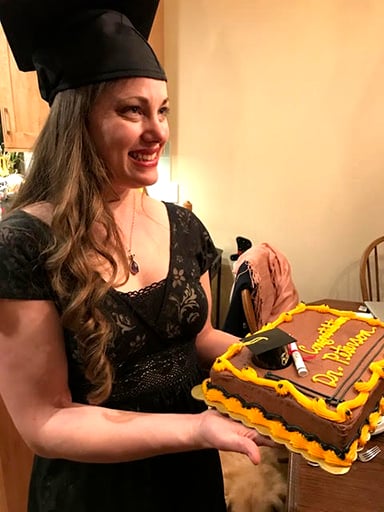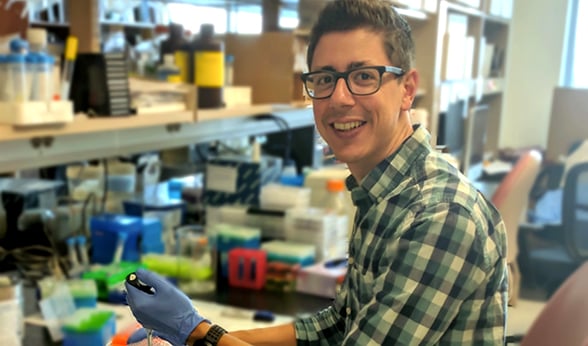Two University of Colorado Denver | Anschutz Medical Campus alumni have earned prestigious AAAS Science & Technology Policy Fellowships. They are among the latest class of policy fellows – 280 scientists and engineers – who will spend a year serving professionally in federal agencies and congressional offices.
Mark Lucera and Juliette Petersen won the fellowships, which are operated as part of the American Association for the Advancement of Science (AAAS) mandate to “advance science and serve society.” Petersen graduated in December 2016 with her PhD from the CU Anschutz Molecular Biology Program, while Lucera is a CU Anschutz postdoc and finished his doctoral work in the Molecular Virology program at Case Western Reserve University in January 2016.
[cucalloutbox align="left" color="" class="" size=""]
Application deadline
The application deadline for the 2018-19 AAAS Science & Technology Policy Fellowship class is fast approaching – Nov. 1. For more information about the fellowships, visit the AAAS website. Information is also available through the Postdoctoral & Career Development Office in the CU Denver | Anschutz Graduate School.
[/cucalloutbox]
Since the program’s inception in 1973, over 3,600 AAAS policy fellows have supported congressional offices, executive branch agencies and departments and the judicial branch, seeding virtually every corner of Washington, D.C., and beyond with a high caliber of scientific know-how.
Following is a Q&A with Lucera and Petersen about how they became interested in the AAAS S&T Policy Fellowship, how their training at CU Anschutz prepared them for the program, and what they’re hoping to achieve in their career.
Juliette Petersen
When did you get interested in this program?
I first got interested in the AAAS STPF in 2006 when I was volunteering on Bill Ritter's gubernatorial campaign in Colorado. I had left a doctoral program in synthetic organic chemistry in 2005, but I knew that science was in my blood. During the campaign I was discovering a love of policy, too. At one of the campaign planning meetings, I met a PhD scientist who was working as a science advisor to someone at the national level, and he told me about AAAS STPF. I don’t even remember his name or who he worked for, but I went home and started researching the fellowship program and realized that it was exactly what I was looking for – an opportunity to meld my love of science with my desire to be involved in policymaking. With that in mind, I went back for my PhD in molecular biology (which I found much more gratifying than organic chemistry!) and the rest is history!
What are you hoping to do career-wise?
 Juliette Petersen
Juliette Petersen
The crazy thing is that after working toward this fellowship for over 10 years, I never planned beyond the fellowship. Actually, it’s not as crazy as it sounds – everyone who has been a Fellow talks about how the experience is life-changing, and how you will meet so many people and open doors through the fellowship that you didn’t even know existed. I know that I have a strong interest in global health and I would like to explore that and food sustainability during my fellowship. After that? Well, I know I want to continue to work at the intersection of science and policymaking and to continue to bring scientific thinking into the policymaking conversation.
How did your training at CU Denver / Anschutz prepare you for this program?
Honestly, it was mostly my activities outside of my “training” at CU Anschutz that prepared me for this program, though of course you need to have a solid scientific training in order to bring scientific reasoning and thinking to the table. I was active in the Careers in Science Club (www.careersinscienceclub.com) for almost all of my time at CU Anschutz, including when we were asked to change the name from “Alternatives in Science” to something that more closely reflected the fact that non-academia career tracks are no longer “alternative.” I participated in various CU Advocacy Days at the State Capitol, and got involved in additional advocacy through the March of Dimes. I participated in as many outreach opportunities as I could, including Young Hands in Science, which brought real scientists into elementary schools to teach various science modules. I also took advantage of numerous opportunities offered by the NIH BEST grant. Basically, I did as many “extracurricular” activities as I possibly could without sacrificing my lab work.
What advice would you have for others who might want to consider this path?
Get out of the lab. Seriously. What are you passionate about? Start a club or get involved in a pre-existing one. Seek out leadership opportunities. Take advantage of the numerous outreach opportunities available through CU Anschutz or find/create your own. I know you don’t have a lot of free time in grad school, but it’s worth it for your sanity to have something outside of lab. No matter what career path you choose, you need to work on communicating clearly and concisely (without science jargon), so you might want to start thinking about that, too. You don’t have to be doing advocacy or policymaking – the Fellowship will provide you with numerous professional development opportunities to build those skills – but you DO need to be involved in something beyond your own research.
Mark Lucera
When did you get interested in this program?
I first learned about the AAAS Science and Technology Policy Fellowship while I was a PhD student in the Molecular Virology program at Case Western Reserve University. I was in a "career exploration" phase toward the end of my training and I saw the AAAS fellowship as a unique opportunity to combine my interests. I almost applied back then but decided instead to expand my expertise in a postdoctoral fellowship. I wanted to learn from a mentor whose role as a physician lends strong appreciation for public health, so I chose to come to CU Anschutz to train within the Division of Infectious Diseases in the Department of Medicine. My experience as a postdoc taught me a number of skills but it also reignited my drive to apply for the AAAS fellowship.
What are you hoping to do career-wise?
 Mark Lucera
Mark Lucera
I thrive when I'm given opportunities to communicate, so combining my passion for science in a policy setting is a really good fit. My training up to this point has largely been studying infectious diseases like HIV/AIDS in the laboratory. As an AAAS fellow, I'll be approaching my field from a different perspective, working on international health and biodefense policy. I can see myself staying in the global health realm after my fellowship, whether in government, specialized agency or NGO.
How did your training at CU Denver / Anschutz prepare you for this program?
My postdoc helped me in a number of ways. In the lab, I continued research on HIV/AIDS while also branching out to study additional viruses. I also had the opportunity to collaborate with global health folks studying disease burden in Central America. This was shortly after the wave of Zika virus, and being involved gave me a newfound appreciation for the international relationships required to combat epidemics.
Outside of the lab, I was very active in our Postdoctoral Association. I chaired of our Engagement Committee, tasked with developing programs that enriched social and professional relationships amongst postdocs. I also helped start a scientific advocacy initiative called Project Bridge and gained direct experience building relationships with Colorado policymakers and our local community. I can't emphasize enough the importance of these leadership roles in growing my communication skills. They've also been a lot of fun and I'm really grateful.
What advice would you have for others who might want to consider this path?
Two things. First, invest time in assembling your "professional development toolbox". Build your communication skills, get involved with advocacy or outreach, practice writing to diverse audiences, participate in the Postdoctoral Association. Your technical expertise will be a strong engine, but these other skills will actually allow you to drive the car.
Second, remain flexible. The AAAS fellowship attracts folks from many backgrounds, and placement opportunities are just as diverse. The common thread is that we're all expert problem solvers. While I'm staying roughly in the same field, there are fellows who use this experience to explore new areas at the intersection of science and policy.
